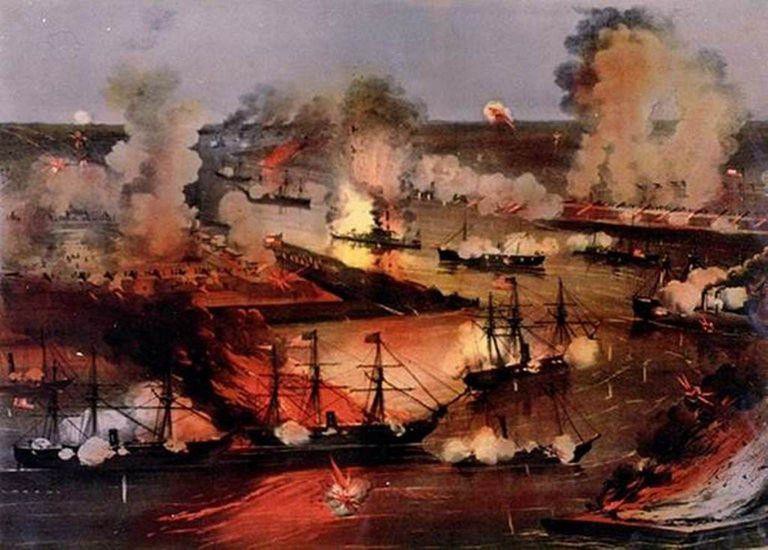ALL NATIONAL HISTORIES ARE CONNECTED
America’s Civil War
Was A Global Event (#2)
YOU’D BE SURPRISED

The Battle of New Orleans (1862)
The American Civil War.
Germans started it. So did the Dutch. Definitely, the Dutch. Africans and Irishmen fought it.
Britain helped finance it.
Canada and Cuba watched its every advance and retreat with the rapt attention of hiding rabbits watching a family of foxes.
Brazilian reporters sent dispatches home to readers waiting eagerly for news.
A Frenchman’s invention became its primary weapon.
Russia hoped to gain from it, sending her seagoing schooners to Sydney and San Francisco and New York to leverage events towards its own advantage.
Austria’s Emperor saw it as an opportunity for him to conquer Mexico (and Texas).
The war’s final shots sent crowds cheering from Perth to Liverpool. Its aftereffects changed India forever.
Its lead player is still a hero in Hungary, and his speeches are memorized today, this very week — right now — by Japanese schoolchildren.
The American Civil War was fought in America by citizens of the world.
Some say that the Americans fought their Civil War on behalf of the world. The War Between the States and its vast, rich, complicated, sometimes contradictory history belong to the world. Because that endlessly fascinating chain of events between Fort Sumter on April 11, 1861 and Palmetto Ranch on May 13, 1865 (or should I say between the South Carolina secession and the surrender at Appomattox Courthouse) are so uniquely American, it is easy to forget it that it was a dominant global event of the 19th century, perhaps the most far-reaching of a dozen earth-shattering events during those 100 years.
Nanbokusenso (“South-North War”) is what they called it in Tokyo, Sezessionskrieg in Munich and Berlin. Other nations seemed to think it was a sort of aberration at first, a squabble, a dust-up that would last perhaps a week or two. When the squabble turned into Bull Run, they sent correspondents like Fyodor Dostoevksy, Alexis de Tocqueville, and Karl Marx to make sense of it all.
Mexico banned slavery in 1839.
One million Cantonese left the two provinces of South China between 1840 and 1875, the majority coming from Kwantung.
In 1848, a socialist, worker-led revolution in Germany failed, sending tens of thousands of disaffected Germans – widely known as “Forty-eighters” – emigrated to America, among them a forceful young man named Carl Schurz. They brought a deep reverence for participatory democracy and universal workers’ rights. In the American presidential election of 1860, this same Carl Shurz delivered the votes of 300,000 German immigrants to Abraham Lincoln.
In 1861, Tsar Alexander II freed 21 million serfs.
In January 1863, a nationalist movement in the Russian satellite state of Poland threatened rebellion. England and France supported the Polish bid for independence, Prussia sided with Russia, and it seemed that the European continent was about to be embroiled in another war. War did indeed break out, but it was not in Krakow or Lublin but in a small outpost in North America named Fort Sumter … and it was not between Poland and Russia, but between the Army of the Potomac and the Army of Northern Virginia.
Towering over the cauldron of the War of Secession and its sprawling legacy is the figure of Abraham Lincoln. If the American War of Secession was a local eruption of global forces, then it was Lincoln who vaulted the collective event into a permanent landmark in world history. While Lincoln himself sought an international application of the war and its imperatives, it was his martyrdom that gave him international stature.
History changes.
That is, the way we see and write history changes. In the past few years, some of the most innovative and exciting scholarship in American history has been history that is not, well, American. It has been framed in new ways — ways that do not necessarily conform to the traditional narratives of a nation-state.
The Civil War was a necessarily violent resolution to end the commerce of slavery for once and for all. It was an existential crisis which threatened to end the American experiment in democracy. The Civil War was a ground-fire, sparked by lightning, which cleared the path for modernity. The Civil War was the sad result of a series of short-sighted mistakes by a generation of self- interested leaders. There is a world of opinion now, just as there was a world of participants then.
We all see what we want in the War Between the States. And there is such a great deal to see.
# # #